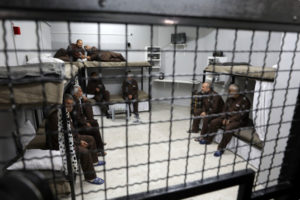
Israel
's right-wing opposition Likud party leader Benjamin Netanyahu in Jerusalem on February 8, 2009. Netanyahu remained the frontrunner ahead of next week's elections, according to three polls. Likud is credited with 25 to 27 mandates in the 120-seat parliament as compared with 22 to 23 for Foreign Minister Tzipi Livni's Kadima party, the surveys showed. AFP PHOTO/LEON NEAL (Photo credit should read Leon Neal/AFP/Getty Images) " width="300" height="217" /> An Israeli woman walks past a poster for Israel’s right-wing opposition Likud party leader Benjamin Netanyahu in Jerusalem on February 8, 2009. Netanyahu remained the frontrunner ahead of next week’s elections, according to three polls. Likud is credited with 25 to 27 mandates in the 120-seat parliament as compared with 22 to 23 for Foreign Minister Tzipi Livni’s Kadima party, the surveys showed. AFP PHOTO/LEON NEAL (Photo credit should read Leon Neal/AFP/Getty Images)Haifa, 28 Jumadil Awwal 1436/19 March 2015 (MINA) – With more than 99 percent of the votes tallied, Israel’s incumbent Prime Minister Benjamin Netanyahu appears poised to retain his office and form the next government.
Though the final campaign polls showed Netanyahu’s right-wing Likud party trailing behind the centre-left Zionist Union, headed by Isaac Herzog, Likud gained 30 seats, six more than its main competitor, according to official results released on Wednesday, Al Jazeera quoted by Mi’raj Islamic News Agency (MINA) as reporting.
The Joint Arab Coalition, an electoral alliance of four Palestinian-majority parties in Israel, pulled 14 seats, and Yesh Atid, the centrist party headed by former finance minister Yair Lapid, earned 11 seats. Kulanu, a right-wing breakaway party led by former Likud member Moshe Kahlon, took ten seats.
Arab bloc claims third largest force in Israeli parliament
Also Read: Hamas Agrees to Release 10 Israeli Hostages Amid Ongoing Gaza Ceasefire Talks
A number of smaller, mostly right-wing parties were unable to break the single digits: Jewish Home earned eight seats, the religious Shas and United Torah parties each got seven and the ultra-nationalist Yisrael Beitenu has six seats.
The left-wing Zionist party Meretz walked away with four seats.
Israeli President Reuven Rivlin has called for a national unity government including both Likud and the Zionist Union, but that prospect is unpopular with most Jewish Israeli voters.
According to a poll conducted by Israel’s Channel 10, 53 percent of Jewish Israelis oppose such a coalition.
Also Read: Israel Kidnaps Over 30 Palestinians in West Bank, Including Children
Some analysts expect Netanyahu to cobble together a coalition with right-wing and religious parties.
The Likud party announced on Wednesday morning that Netanyahu has reached out to leaders of the parties with which he hopes to form a coalition: the Jewish Home party, Kulanu, Yisrael Beitenu, Shas and the United Torah Party. (T/P001/P3)
Mi’raj Islamic News Agency (MINA)
Also Read: Israel’s Aggression on Gaza Continues With Mounting Civilian Casualties and Destruction
































 Mina Indonesia
Mina Indonesia Mina Arabic
Mina Arabic